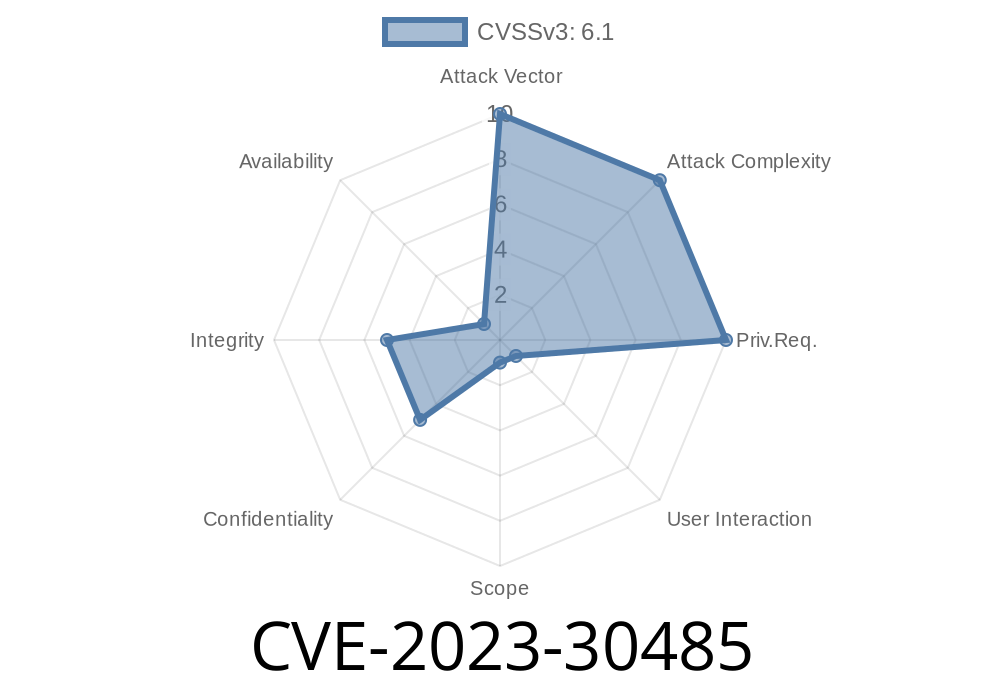A vulnerability identified as CVE-2023-30485 has been discovered in the Avartan Slider Lite WordPress plugin by Solwin Infotech, affecting all versions up to and including 1.5.3. This flaw is an unauthenticated Reflected Cross-Site Scripting (XSS) vulnerability, which means attackers can execute malicious scripts in the browsers of visitors to your website—without needing to log in.
This weakness could allow someone to steal session cookies, hijack accounts, or perform other harmful actions. This post attempts to break down, in straightforward words, how this XSS bug works, how it can be exploited, and how you can protect your WordPress website.
What is Reflected XSS?
Reflected XSS occurs when a web application immediately reflects user-supplied data in a page without properly filtering or escaping it. When the input is not sanitized, an attacker can inject malicious JavaScript, causing it to be run in someone else’s browser.
Where’s the Problem? (Technical Details)
The vulnerability is present in versions 1.5.3 and below of the Avartan Slider Lite plugin. The vulnerable code appears in how the plugin handles user input parameters—specifically, it echoes values from the URL without proper sanitization or escaping.
Example Vulnerable Code
In one of the plugin’s files (for example, avartanslider-lite.php or a related admin page file), there might be a PHP statement similar to:
echo '<div>' . $_GET['tab'] . '</div>';
If the 'tab' parameter is not sanitized, any value can be injected and rendered as HTML—including scripts.
`
`
When a site admin or user visits this link, the injected JavaScript (in this case, an alert popup) is executed.
2. The payload could be much more harmful, such as stealing cookies or performing actions on behalf of the victim.
Proof-of-Concept (PoC) Link
Replace example.com with your real domain, and you’ll see a popup with the user’s cookies if the site’s using the vulnerable plugin:
https://example.com/wp-admin/admin.php?page=avs-slider-lite&tab=<script>alert(document.cookie)</script>;
Note: This is just for education and testing on your own environment!
Video Demonstration
Watch a quick test demo on TryHackMe’s vulnerable WordPress box
Unauthenticated: Anyone can exploit this, without logging in.
- Admin Context: Since this occurs in the admin area, it can target logged-in administrators, opening the door to full site compromise.
- Stealing Cookies / Hijacking Sessions: Malicious scripts could steal sensitive info or even create new admin users.
Patch Now!
Solwin Infotech released version 1.5.4 that fixes this XSS flaw. Upgrade now via your WordPress dashboard, or download the patched version directly.
Disabling the plugin until patched.
- Installing a security plugin that provides XSS filtering, like Wordfence.
References
- Wordfence Advisory on CVE-2023-30485
- NIST NVD: CVE-2023-30485
- Plugin Changelog
- What is Reflected XSS? - OWASP
`
https://yoursite.com/wp-admin/admin.php?page=avs-slider-lite&tab=
Final Thoughts
CVE-2023-30485 is a classic example of what happens when user input isn’t validated. Reflected XSS is easy to exploit, hard to track, and very dangerous especially in plugins with high privileges like WordPress admin panels.
Patch your plugins often, audit your sites, and always sanitize input. XSS is still here because we ignore the basics!
Did you find this post helpful? Be sure to share and help secure the WordPress community!
*For educational and research purposes only. Do not exploit vulnerabilities on sites without permission.*
Timeline
Published on: 09/04/2023 12:15:09 UTC
Last modified on: 09/06/2023 22:32:53 UTC
